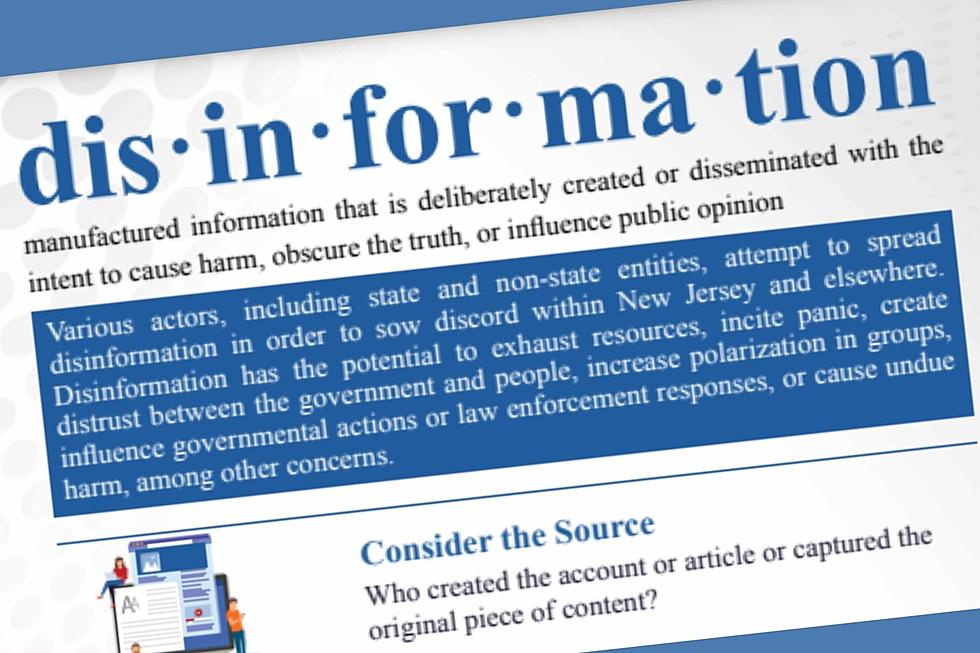
New Jersey Homeland Security Director cautions businesses and residents about cyber scams and more
There are a number of bad actors out there trying to prey on anyone and everyone from individuals to businesses and groups of all kinds looking to steal from you and take everything you have.
It's not just the dark web, some cyber crimes and scams are right there in front of you, so you need to be cautious, aware, and alert, to protect yourself and those around you.
To discuss cyber crimes, in-person security, how to report crimes you witness, remembering 9/11 and how it changed history, New Jersey Department of Homeland Security and Preparedness Director Laurie Doran -- who also previously spent 32 years in the CIA -- joined us as a guest on 'Shore Time with Vin and Dave' on 94.3 The Point and 105.7 The Hawk on Sunday morning.
It's important to note, to start with, that there is nothing imminent in terms of a threat to the Garden State right now from terrorism or another group or crime.
"There is no known or credible threat to New Jersey at this time, so, I want everyone to know that we are on it and we have been continuing on it 24/7/365 at the federal, state, and local level," Doran told Townsquare Media.
Since 9/11, one of the things that have changed is the lines of communication between federal and state agencies domestically, for the better.
"Prior to 9/11 -- national level, a lot of organizations and law enforcement agencies, other intelligence agencies at the federal level -- they had a lot of information but they weren't necessarily sharing it very well, it was very stove-piped, and, if there's one lesson we learned from 9/11 is that those stove pipes or those petty disagreements among agencies -- those walls had to come down," Doran said. "I'm happy to report that post 9/11, the whole concept of information sharing -- really information sharing, not just saying you're doing it -- and collaboration really came to the forum. At the national level, we really shared a lot with all of our partners, and, even now working at OHSP in New Jersey, one of our main goals is information sharing amongst our partners at all levels and also with the public and with the law enforcement community."
There are bad actors, terrorists, and others seeking to harm many -- and again, there is no credible or known threat right now -- but NJOHSP and other state and federal and local agencies are keeping an eye on everything every second of every day to ensure our safety and to let us know what we can do in our lives to keep everyone and everything safe and protected.

"Cyber was nowhere near what it is now -- so, that wasn't really an issue so much around 9/11, but, since that time, our Homeland Security module has progressed through proactive strategy and reactive operations. Our focus on public safety remains the same, but the tactics and strategies have changed as we've learned new lessons and priorities are identified, so, in that respect with cybersecurity, it's still very much a new specialty in government," Doran said. "As the threat landscape evolves -- we have to evolve and we have to innovate and develop new strategies, and so, our office is the state agency that is responsible for looking at cyber security and helping to protect the state government but also to help the general public keep themselves safe."
From your phone to your tablet, laptop, etc., there is more of a need for protection than ever before, so it's important to follow the safety tips and steps coming from NJOHSP and law enforcement so you can be safe.

"We all use our smartphones and if you don't have a smartphone, you have a computer, and unlike in more traditional realms of attacks -- there's no physical boundaries in cyberspace, and threat actors don't discriminate, they target anyone," Doran said. "There are people, unfortunately, both domestically and internationally that are looking to sabotage operations at schools, hospitals, banks, other critical infrastructure entities, local governments, police departments, individuals themselves -- oftentimes are using ransomware and looking for a payout. What I want to emphasize is that what we look at a lot from our side of the coin here is -- we do help the public, obviously, but we're looking more at institutions versus things against individuals, we do things like that but, say someone has a scam of like an Amazon gift card, we coordinate that with the Attorney General's Office who does have the Office of Consumer Affairs."
Some safe and best practices for individuals and institutions to follow at all times starts by playing good defense.
"Our analysts in the cyber arena found that 85 percent of the breaches that happen have a human nexus, what I mean by that is that most of these cyber incidents are avoidable if people follow a few best practices, and we like to call that cyber hygiene," Doran said. "Multi-factor authentication -- for example, perhaps if you're looking at your banking stuff on your smartphone and you try to log in to your account and then they ask to send you a number as a text -- that would be an example of multi-factor authentication. We should be doing that for everything that you're doing online."
One other important measure to take is keeping everything security-wise up to date.
"If you get software updates, do them, because it's only to protect yourself," Doran said.
You can listen to the full interview conversation with New Jersey Department of Homeland Security and Preparedness Director Laurie Doran on 'Shore Time with Vin and Dave' on 94.3 The Point and 105.7 The Hawk on Sunday, right here.
Part One:
Part Two:
How New Jerseyans remember 9/11
When Ocean and Monmouth County Police saved the day
Honoring our Military and Veterans
More From 92.7 WOBM









